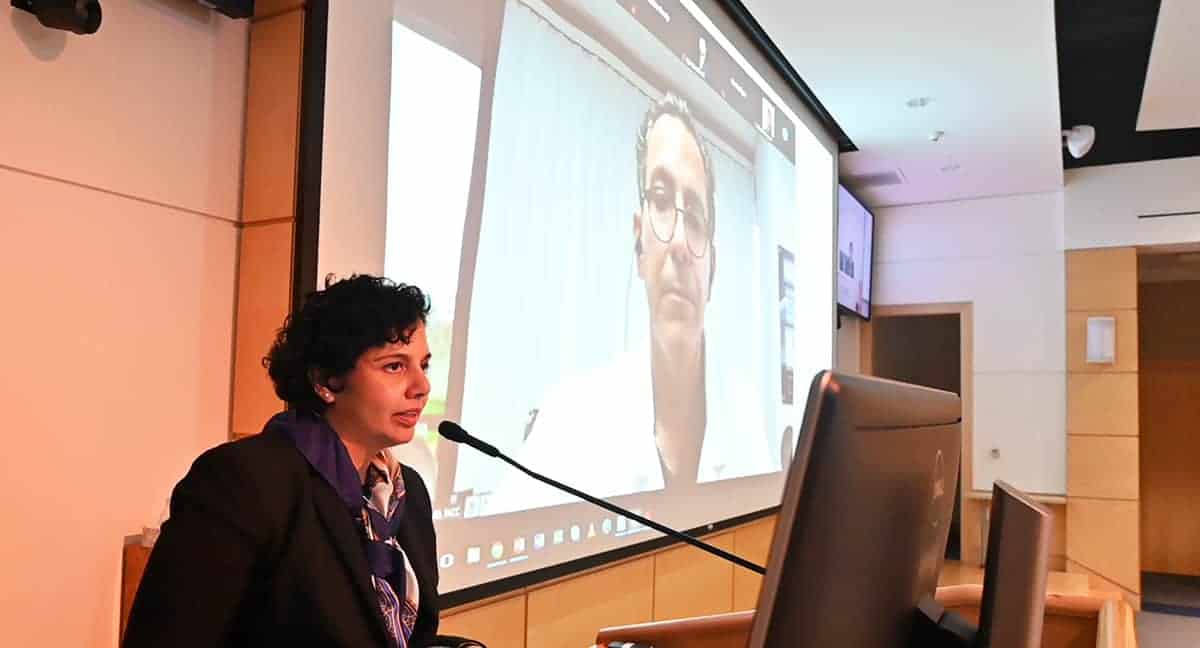21st Geriatrics Update Focuses on ‘Living Long, Living Strong’
| The foods older adults eat can be just as, or even more, vital to their heart health as the cardiovascular medications they take and the surgeries and procedures they may undergo.
That’s the message keynote speaker, Joel Kahn, M.D., gave at the 21st annual Geriatrics Update and Long-term Care Conference held Oct. 1-3 at the UAMS Donald W. Reynolds Institute on Aging.
More than 100 people attended the conference, which provides the latest information to physicians and other health professionals, as well as caregivers, to the aging population. Most of the audience listened via a live video stream due to the ongoing COVID-19 pandemic.
The conference was supported by UAMS, Arkansas Medical Society, Arkansas Department of Human Services, Senior Living Solutions, Elder Independence Home Care, Presbyterian Village and Arkansas Office of Drug Director. The conference is also supported annually by Jeanne Wei, M.D., Ph.D., executive director of the Reynolds Institute on Aging.
The theme this year was “Healthy Bodies and Minds: Living Long, Living Strong.” Throughout the three-day conference, the speakers and expert panels covered a wide range of topics, from falls prevention, maintaining hydration, the COVID-19 pandemic, and excess use of opioids in older adults.
“A healthier lifestyle, including a plant-based diet, can help older adults to avoid or delay the need for surgery or the negative health outcomes from cardiovascular disease,” said Kahn, a preventive cardiologist and clinical professor of medicine at Wayne State University School of Medicine in Detroit, Michigan.
In one study Kahn cited, a control group of patients had an average of 41% blockage of arterial blood flow due to cardiovascular disease. At one year, they had progressed to a 42% blockage and at five years, to 52%. However, patients who took part in an intensive lifestyle program of healthy eating and regular exercise experienced a 300-400% increase in blood flow to the heart and a 50% reduction in the need for additional surgery or procedures.
If patients greatly reduce their intake of dietary fat and high-carbohydrate snack foods, “we would have a good chance of stopping or even potentially reversing an advanced disease progression,” Kahn said.
Another recent study comparing nonsurgical cardiovascular patients who followed an intensive lifestyle program with patients who only had heart surgery showed both groups had similar health outcomes.
Kahn reviewed several dietary programs for good cardiovascular health. Most include large proportions of fruits and vegetables such as beets and lentils; whole grains along with nuts, seeds, tempeh and tofu; and limited amounts of animal protein including some fish and lean poultry.
“Heart disease is something we can identify early in most people through blood work and advanced testing,” Kahn said. “We can address it through diet, exercise and avoiding bad habits like smoking.”
Kahn responded to questions and comments from the virtual audience and two or three clinicians present in the auditorium at the Reynolds Institute, including Wei.
Wei, a geriatrician, said that older adults she sees as patients at UAMS, many in their mid-80s or older, often have trouble maintaining their body weight and physical strength due to reduced caloric intake. Those patients probably need to consume a higher percentage of protein because they face greater challenges in assimilating efficiently and utilizing the ingested proteins and other nutrients as they digest the food.
“The plant-based diet is fantastic, but there comes a certain point when the very old may need to consume animal protein to maintain muscle mass,” Wei said. “It takes a lot more to maintain muscle mass when you get older because of the changes nutritional assimilation, digestion and reutilization of amino acids from protein you take in.”
Conference presenter Amanda Dawson, M.S., spoke about weight loss in older adults, when it may be recommended, and risks that need to be minimized when older patients need to lose weight. Dawson is a registered dietitian with the UAMS Clinical Nutrition Department and an adjunct instructor in the UAMS College of Health Professions, Department of Dietetics and Nutrition.
“We need to think about changes to body composition that tend to occur with advancing age, like sarcopenia — the loss of muscle mass that tends to occur with aging,” Dawson said. “Any time we lose weight as seniors, we also lose muscle. We’re aging and losing muscle mass, too. We want to look at approaches that conserve muscle mass.”
Weight loss in obese older adults needs to be intentional, gradual and planned, she said. A recent study of 17 weight-loss diets concluded there was not enough evidence to recommend one diet over another.
Instead, Dawson said an older adult who needs to lose weight should follow a diet made for them that includes some healthy foods they typically eat when not dieting. This way they are more likely to keep with a plan, helping to maintain a healthier weight.
“It’s important when we think about sensible weight loss for our senior adults that we develop an individualized plan – their goals, their desire and their health status,” Dawson said. “We definitely want to include a mildly reduced-calorie diet, weekly physical activity of 150 minutes or more if able, with strength and resistance training, and behavioral and lifestyle strategies.”
